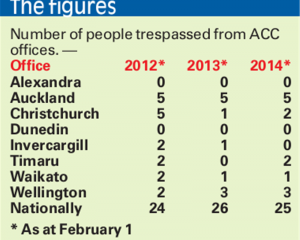An ACC strategy document for the future management of long-term claims, obtained by Access Support Services under the Official Information Act, reveals ACC's concern about 12,000 claimants on long-term weekly compensation who could potentially return to the workforce, or "independence".
The February paper warned that numbers had been growing at 5% a year and that this could have a potential $1 billion impact on its long-term liabilities by June this year.
The average age of long-term clients - those on the scheme for longer than 12 months - was 52. After five years, they were counted as likely to remain on the scheme until retirement.
"The potential therefore for the greatest reduction in the liability comes from achieving exits from the scheme of those claims of five-plus years. In order to stem the flow of claims moving into the five-year-plus category, work from the three-year duration mark is considered likely to have the most effect."
It argued that ACC management of long-term claims was fragmented and inconsistent and that frontline staff were too swamped by new claims to focus on more complex cases.
It suggested a team of 67 case managers be employed to target this group, particularly higher income earners.
It talked of the need for a culture change among staff to deal with "non-compliant behaviours by clients" and to enhance clients' personal responsibility.
"There has been a shift in the ideological basis of ACC ... there appears to be now a stronger tolerance to dealing with non-compliant behaviour and increasing personal responsibility by clients."
It predicted savings of $900 million to $1.4 billion within four years if each case manager could return between 12 and 20 claimants a year (800 to 1340) to independence.
But rather than hire and train the additional staff, ACC opted to outsource the project. It is negotiating with four private rehabilitation firms which will target an initial group of 1500.





